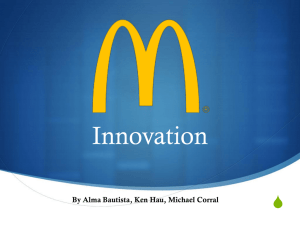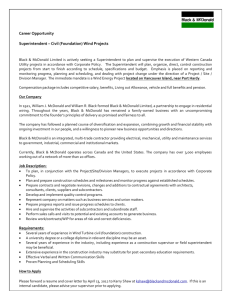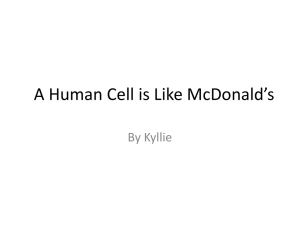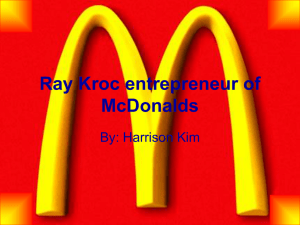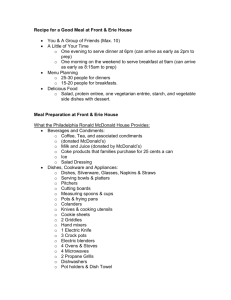Verze A-section 1: Reading Comprehension
advertisement
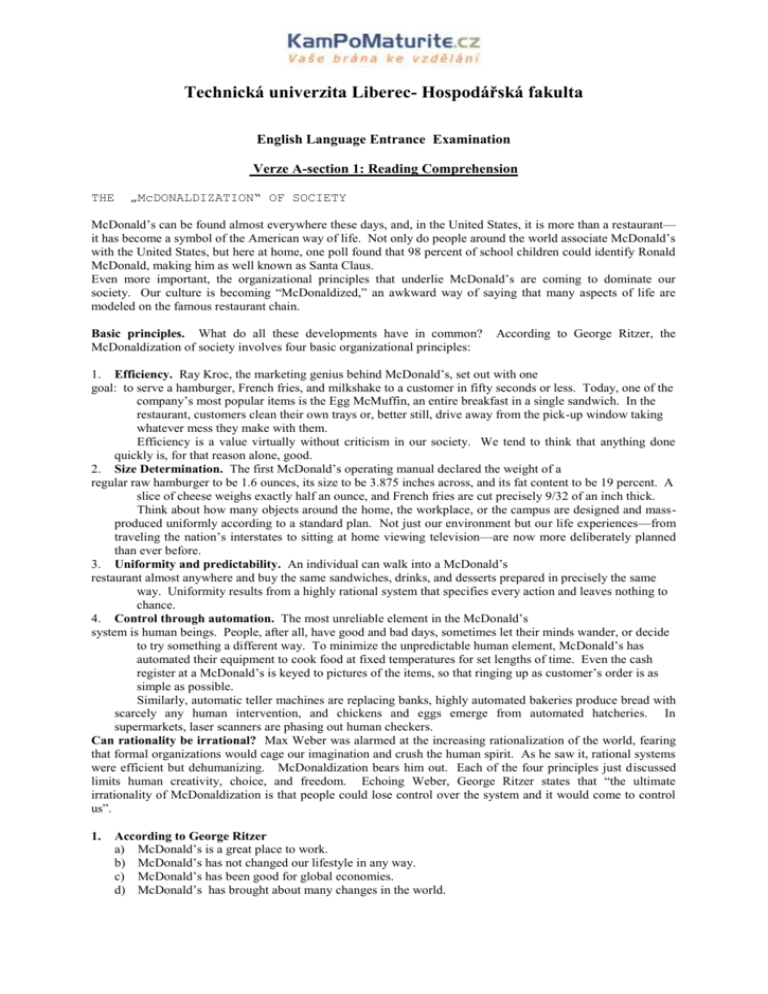
Technická univerzita Liberec- Hospodářská fakulta English Language Entrance Examination Verze A-section 1: Reading Comprehension THE „McDONALDIZATION“ OF SOCIETY McDonald’s can be found almost everywhere these days, and, in the United States, it is more than a restaurant— it has become a symbol of the American way of life. Not only do people around the world associate McDonald’s with the United States, but here at home, one poll found that 98 percent of school children could identify Ronald McDonald, making him as well known as Santa Claus. Even more important, the organizational principles that underlie McDonald’s are coming to dominate our society. Our culture is becoming “McDonaldized,” an awkward way of saying that many aspects of life are modeled on the famous restaurant chain. Basic principles. What do all these developments have in common? McDonaldization of society involves four basic organizational principles: According to George Ritzer, the 1. Efficiency. Ray Kroc, the marketing genius behind McDonald’s, set out with one goal: to serve a hamburger, French fries, and milkshake to a customer in fifty seconds or less. Today, one of the company’s most popular items is the Egg McMuffin, an entire breakfast in a single sandwich. In the restaurant, customers clean their own trays or, better still, drive away from the pick-up window taking whatever mess they make with them. Efficiency is a value virtually without criticism in our society. We tend to think that anything done quickly is, for that reason alone, good. 2. Size Determination. The first McDonald’s operating manual declared the weight of a regular raw hamburger to be 1.6 ounces, its size to be 3.875 inches across, and its fat content to be 19 percent. A slice of cheese weighs exactly half an ounce, and French fries are cut precisely 9/32 of an inch thick. Think about how many objects around the home, the workplace, or the campus are designed and massproduced uniformly according to a standard plan. Not just our environment but our life experiences—from traveling the nation’s interstates to sitting at home viewing television—are now more deliberately planned than ever before. 3. Uniformity and predictability. An individual can walk into a McDonald’s restaurant almost anywhere and buy the same sandwiches, drinks, and desserts prepared in precisely the same way. Uniformity results from a highly rational system that specifies every action and leaves nothing to chance. 4. Control through automation. The most unreliable element in the McDonald’s system is human beings. People, after all, have good and bad days, sometimes let their minds wander, or decide to try something a different way. To minimize the unpredictable human element, McDonald’s has automated their equipment to cook food at fixed temperatures for set lengths of time. Even the cash register at a McDonald’s is keyed to pictures of the items, so that ringing up as customer’s order is as simple as possible. Similarly, automatic teller machines are replacing banks, highly automated bakeries produce bread with scarcely any human intervention, and chickens and eggs emerge from automated hatcheries. In supermarkets, laser scanners are phasing out human checkers. Can rationality be irrational? Max Weber was alarmed at the increasing rationalization of the world, fearing that formal organizations would cage our imagination and crush the human spirit. As he saw it, rational systems were efficient but dehumanizing. McDonaldization bears him out. Each of the four principles just discussed limits human creativity, choice, and freedom. Echoing Weber, George Ritzer states that “the ultimate irrationality of McDonaldization is that people could lose control over the system and it would come to control us”. 1. According to George Ritzer a) McDonald’s is a great place to work. b) McDonald’s has not changed our lifestyle in any way. c) McDonald’s has been good for global economies. d) McDonald’s has brought about many changes in the world. 2. Ray Kroc a) was the original Ronald McDonald. b) tried to do away with as much human error as possible at McDonald’s. c) liked individual thought and imagination. d) thought the employees should make the decisions about how to prepare food. 3. According to this article most American children today a) think McDonald’s is good for the economy. b) eat at McDonald’s. c) can identify Ronald McDonald almost as easily as Santa Claus. d) always order French fries and a milkshake. 4. Under the section on “Efficiency”, people tend to think that anything done quickly is good. This means a) human beings are always efficient. b) efficiency is a value with almost no criticism in American society. c) if you always do it fast it will sell. d) Americans are never in a hurry at McDonald’s. 5. Throughout the world a person could expect to walk into a McDonald’s restaurant and a) find an automatic teller machine(cash machine). b) order just about the same items as you do at any location. c) get a job there. d) get your food in less than 30 seconds. 6. A result of “McDonaldization” throughout the world is that a) many aspects of our daily life are modeled after the McDonald’s food chain. b) Hindus now eat beef. c) employees model their lives after McDonald’s food chain. d) milkshakes outsell soft drinks. 7. Max Weber a) would have probably thought of McDonald’s as creating human imagination and spirit. b) would have probably enjoyed eating at McDonald’s. c) observed that rational systems were efficient but dehumanizing. d) would have encouraged the growth and spread of McDonald’s. 8. Which is not one of George Ritzer’s principles of the McDonaldization of society? a) diversity and predictability b) size determination. c) control through automation d) efficiency 9. Another principle according to George Ritzer is that a) design and uniformity of our environment and life experiences are now more deliberately planned than ever before. b) McDonald’s will always be a successful fast food chain. c) Egg McMuffin is an entire breakfast at McDonald’s. d) all McDonald’s hamburgers must be the same size. 10. The first McDonald’s operating manual declared the weight of a regular hamburger to be 1.6 ounces and its size to be a) three point eighty-seven inches across. b) thirty point eight-hundred seventy inches across. c) thirteen point eighty-five inches across. d) three point eight-hundred seventy-five inches across. Section 2: English Grammar and Vocabulary Instructions: Choose the best answer. 11. He a) tried hard to find a job, but he had no luck. b) tried hardly c) hardly tried 12. John had lived in the village for 20 years. ______________, the locals still considered him an outsider. a) Despite b) Consequently c) Nevertheless 13. When Martin decided to sell his car he placed a(n)_________ in the local newspaper. a) announcement b) advertisement c) notice 14. _______________an insurance agent, it is necessary to pass the state examination. a) One becomes b) Having become c) To become 15. Brian has got three houses, five cars and a yacht. He __________ earned a lot of money. a) should have b) must have c)would have 16. Choose the correct sentence. a) Computers have lots of informations. b) Computers have a lot of information. c) Computers have many informations. 17. I am a university student. I study __________. a) economy b) economics c) economical sciences 18. Choose the correct sentence. a) I am from the Czech republic. b) I am from the Czech Republic. c) I am from Czech Republic. 19. Ballet dancers, _____________actors, must spend many hours a day practising before a performance. a) such as b) like c) same as 20. I haven´t seen them for a year. a) It is a year since I saw them. b) It has been a year since I saw them. c) It is a year since I have seen them. 21. Why did they make him_______________outside? a) wait b) to wait c) waiting 22. Tom wanted to explain everything, but Mary____________ . a) cut off b) cut out c) cut in 23. Martha ________________hurried so much to the railway station because the train was 20 minutes late. a) may have b) must have c) needn´t have 24. Martin owned nothing but the __________he wore. a) clothes b) cloths c) clothings 25. I don´t think you have seen Paul before, _________? a) have you b) haven´t you c) do you 26. There is no point_________________for them now. a) waiting b) in waiting c) to wait 27. If he had told me the truth, I __________ him. a) would not have ignored b) will not be ignored by c) would not be ignored by 28. Jack applied ___________a new job. a) to b) about c) for 29. I________________a new alarm clock the other day in the jeweller´s, when I actually__________ somebody shoplifting a) was buying/saw b) bought/had seen c) had bought/saw 30. I am not sure ___________ the green coat is. a) whose b) whom c) who’s CORRECT ANSWERS: 1d, 2b, 3c, 4b, 5b, 6a, 7c, 8c, 9a, 10d, 11a, 12c 13b, 14c, 15b, 16b, 17b, 18b, 19b, 20a 21a, 22c, 23c, 24a, 25a, 26b, 27a, 28c 29a, 30a


